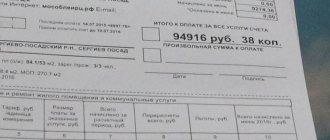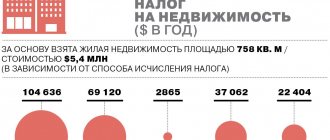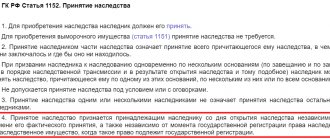Real estate inherited and put up for sale has a bad reputation. Potential buyers avoid such apartments, even if the cost of such real estate is greatly reduced. This is due to the fact that the purchase of an apartment received by inheritance is associated with a high probability of litigation, including litigation, with heirs who have not entered into inheritance rights in a timely manner. How to take into account all the risks when buying an apartment received as an inheritance and other important nuances of such a transaction will be discussed in this article.
Risks when buying an apartment from heirs
Real estate received by inheritance belongs entirely to the heir. He has the right to dispose of it at his own discretion, that is, he can donate, sell or exchange. The Civil Code of the Russian Federation does not provide for any additional requirements when concluding transactions the subject of which is real estate received by inheritance. In particular, because of this, there are risks of buying an apartment by inheritance. Even experienced lawyers, not to mention ordinary citizens, cannot take into account all the features of inheritance legislation.
Buying an apartment by inheritance means there is a high probability of property claims from heirs whose rights have been violated. Residential real estate, in particular apartments, can be inherited legally or by will.
What should you know if you are planning to buy an apartment received as an inheritance? First of all, a potential buyer of real estate from heirs needs to understand the features of each method of inheritance.
First, you should look at the more common method of inheritance - by law. This method of inheritance involves the division of relatives into queues. The first to claim the inheritance are the parents, children and spouses of the deceased. If there are no such applicants, then relatives from the second line become heirs - these are brothers, sisters, grandparents, and so on.
Quite often it happens that relatives from the first priority do not know anything about the inheritance that has opened. This is where the main risks lie for the buyer who is about to purchase an inherited apartment. The heir takes inheritance rights out of turn, and after that a closer relative appears and challenges the transfer of property. This most often happens in the following situation. The owner of the inherited property has not lived with his wife for a long time, but the marriage has not been officially dissolved. They may probably forget about such an heir, and if he himself does not appear before the notary, then the distribution of the inherited property will take place without him. Even greater confusion arises when entering into an inheritance of 4-5 lines. In such a situation, it is very easy to skip the heir who has more rights.
It is not the responsibility of notaries to search for first-priority heirs. They help those who turn to them and provide evidence of kinship with the deceased to receive an inheritance.
If the purchase of an apartment inherited was made by an heir who entered into the rights of inheritance out of turn, then most likely there will be a court that will oblige the buyer to vacate the residential property. Of course, the court will also decide to recover money from the seller in favor of the buyer, but if it has already been spent or is not in bank accounts, then the return procedure can take decades.
It would seem that buying an apartment, the inheritance of which is confirmed by a will, has fewer risks. This is true, but only partly. There are also a number of risks. The main ones include:
Procedure for selling an inherited apartment that has been owned for less than 3 years
- exclusion from the will of persons who have the right to receive part of the inherited residential real estate. These are minor children and other persons who were dependent on the testator;
- recognition of the heir who managed to dispose of the received inheritance as unworthy;
- challenging a will in court. For example, the legal heirs managed to prove in court that the will was written under duress.
The share of such cases is small, approximately 0.5% of all cases of challenging inheritance rights. But this still happens in judicial practice.
When purchasing an apartment from heirs, you should take into account such an important factor as the statute of limitations. The Civil Code of the Russian Federation provides for a six-month period for entering into an inheritance. In most cases this is enough. As practice shows, not everything is so simple. Some relatives do not know that somewhere there is an inherited house or apartments that they can receive by taking advantage of their rights, others are on long-term treatment and for this reason cannot receive an inheritance, etc. In simple words, they have good reasons for missing the deadline established by law.
According to Article 1155 of the Civil Code of the Russian Federation, a person who has the right to receive property as an inheritance, but for some reason missed the deadline established by law, must file a claim with the court within six months from the moment he learned of the death of the testator. At the same time, according to Article 196 of the Civil Code of the Russian Federation, the statute of limitations on such issues cannot exceed 10 years from the date of violation of the rights of the heirs. Thus, a buyer who bought an apartment from an heir may lose it within 10.5 years from the death of its original owner.
Additionally, it must be said that purchasing an apartment that was inherited less than 3 years ago is associated with another common risk. An heir who decides to sell the property received by inheritance within three years is required to pay a tax to the state in the amount of 13%. All residential real estate over 1,000,000 rubles falls under this rule. To avoid this, the heirs suggest that the buyer indicate a lower value in the contract. If the purchase of an apartment in inherited ownership for less than 3 years is subsequently challenged, then, according to a court decision, the buyer will be awarded a refund of the amount specified in the contract. It is almost impossible to prove that the purchase was made for a different amount.
The lawyer of the Kuznetsova and Partners Bar Association, Irina Kuznetsova, answers:
When you receive an apartment by inheritance, you are not required to pay any taxes. Meanwhile, when registering an inheritance, a notary fee is payable, determined as a percentage of the value of the inherited property.
When selling an apartment received by inheritance, which was owned for less than three years after receiving it by inheritance, the seller is obliged to pay personal income tax in the amount of 13% of the cost of the apartment. However, tax legislation provides for a tax benefit in the form of a property tax deduction in the amount of 1 million rubles. Thus, the tax will be paid in the following amount: (2 million - 1 million) x 13% = 130 thousand rubles.
I am selling an inherited apartment. What tax do I pay?
What subtleties do you need to know about the tax on the sale of an apartment?
What measures should buyers take?
To obtain guarantees when purchasing an apartment that is registered as a property by right of inheritance, you must follow certain rules:
- do not accept offers to buy residential property at a suspiciously low price;
- buy an apartment with the assistance of lawyers;
- obtain title insurance for real estate for at least three years.
If the purchase of an apartment is carried out taking into account all the above rules, then the possible entry into the rights of inheritance of an unaccounted heir will be practically excluded, or at least not so painful for the buyer.
Do I need to pay tax when accepting an inheritance?
The Tax Code of the Russian Federation in Article 217 clearly answers the question of whether property received by inheritance is taxed - no, it is not taxed. It does not matter whether the inheritance is received in cash or in kind, whether it is movable or immovable, and even who the testator is: a relative or a stranger.
Exceptions include royalties and patent royalties, which are paid to the heirs of a deceased author or patent owner. These amounts are recognized as taxable income and personal income tax is paid on it.
Fraud in the sale of apartments received by inheritance
The sale of apartments received as an inheritance is also unpopular because scammers are actively operating in this segment of the real estate market. If the apartment received as an inheritance was sold unconsciously (the heir simply did not know that there were still people claiming to receive the inheritance), then there is a chance to reach an agreement, for example, the heirs will divide the money or other property inherited, but an agreement will not work. They deliberately deceive the buyer.
The fraud scheme is quite simple. The heirs know about each other’s existence, but strive to get more benefits and deliberately receive inheritance rights out of turn. After this, the deprived heir sues and usually wins. Of course, the seller will be obliged to return the money, but it is not a fact that it has not already been spent.
The procedure for inheriting an apartment under a will
The main disadvantage for the buyer is that he will not be able to prove that fraud has occurred. But there is also a positive side. If the buyer, together with law enforcement agencies, was able to convince the court that fraud had occurred, then the property remains his property, and the fraudsters will be punished according to the law. To be fair, it should be said that the latter happens extremely rarely, including due to the inaction of the police.
Tax on the sale of a house received by inheritance
When selling a house received from a testator, the general rules of taxation and the completion of a purchase and sale transaction apply. The heir has the right to sell such a house immediately after receiving a certificate of state registration of ownership. However, in this case, you will have to pay personal income tax at a rate of 13%, since the property has been owned for less than 3 years. The higher the value of the property at which it was sold, the higher the tax deductions will be.
When to pay tax on the sale of inherited property
The obligation to pay tax arises for a citizen upon the sale of property accepted by inheritance, but also not always: property tax on the inheritance of individuals is not paid if at the time of sale the citizen has owned the inheritance for three or more years. It does not matter whether the inheritance is movable or immovable and whether there were kinship or family relations between the heir and the testator.
If the three-year period of ownership has expired, you have the right to sell it without paying any taxes, and the question of whether tax is paid on the sale of inherited property is removed. The tenure period may be reduced down to zero by the law of the subject of the Russian Federation.
Terms and procedure for payment
The law requires: in order to pay tax when selling property received by inheritance, a citizen is obliged to declare it. To do this, before April 30 of the year following the one in which the sale took place and the income was received, the taxpayer submits his tax return in Form 3-NDFL.
The declaration must indicate the amount received upon sale and the applicable deductions, even if after applying the deduction the personal income tax became zero: this is possible, when the value of the property sold was equal to or less than a million, the declaration still needs to be filed.
The personal income tax itself must be paid before July 15 of the same year.









